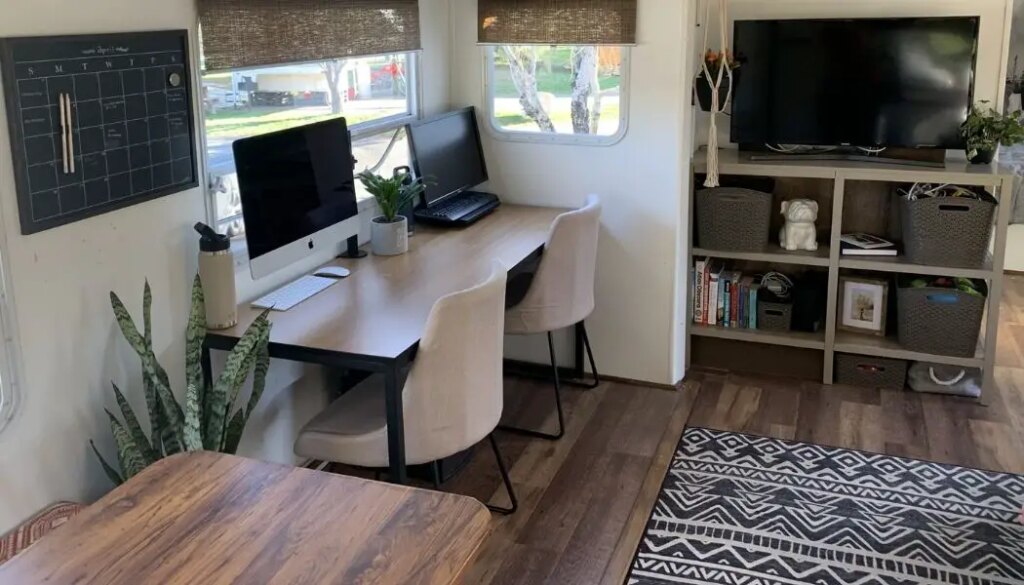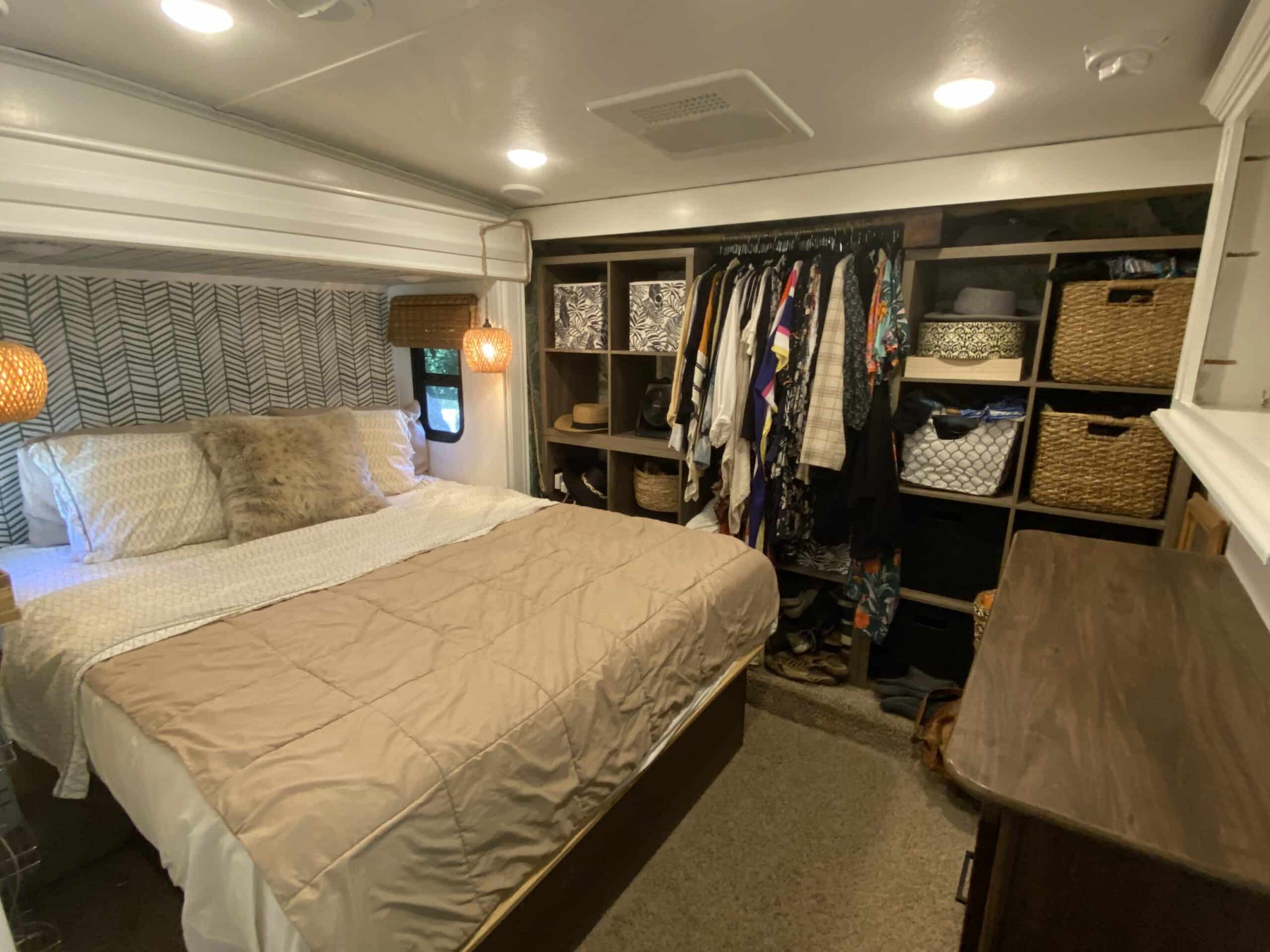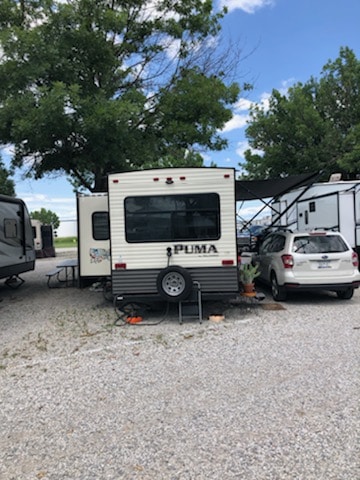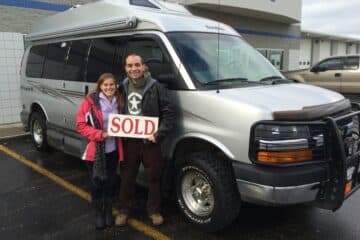
Tips for choosing the best RV for full-time living
Choosing a trailer or motorhome to live in full time (or for extended periods) means considering more than you would for part-time camping. Everyone will have a different answer regarding the “best” RV brands, models, etc., because everyone’s needs and preferences are different.
So, how do you choose?
In this guide, we’ll go over some of the questions you should ask yourself to determine what to look for when purchasing an RV as a full-timer.
A full-time floor plan
Many people will tell you not to choose an RV based on the floor plan alone. This may be good advice, but it doesn’t mean you shouldn’t look for an RV with a floor plan you love. The layout of your RV has a lot to do with how comfortable you’ll be on a daily basis. It’s much easier to put up with minor annoyances when you only use your RV a few times per year than when you have to deal with them full-time.
Here are some things to think about when it comes to your RV’s floor plan:
Cooking and eating
- Do you cook most of your meals at home? Think about counter space for chopping vegetables, storing kitchen appliances, doing dishes, etc.
- Will you be cooking over campfires? If you plan to do most of your cooking outdoors, you might be okay with a smaller kitchen, but don’t forget about when it rains or gets cold outside!
- Will your electricity be limited? If you plan to be off-grid or boondock to save money on campsite fees, you won’t be able to rely on microwaving your food. You might want to steer clear of an RV that doesn’t have an oven.
- Are you more likely to eat at a dining table, on the couch, or outside? The space could be used for another purpose if you don’t need a dining table for eating or working.

Work / School / Office space
- What kind of space is needed for work or study? What options are available in the camper?
- Can this space be used for other activities? Can the dining table be used for work as well? Could you create a master bedroom that is also an office?
Laundry needs
- Does the RV have a washer and dryer? If not, can one be added?
- If you choose an RV that doesn’t have a washer and dryer, will the places you’ll be staying have laundry facilities?
- Will the places you’re staying allow you to hang clothes to dry? (Many RV parks prohibit clotheslines.)
- If you can’t wash and dry your clothes in your RV, how much time (and money) will you spend at a laundromat?

Storage needs
- Do you plan on bringing everything you own, or will you put some of your belongings in storage? Suppose you intend to rent a storage facility or leave some belongings in a family member’s garage or attic. In that case, you may get by with less storage, but if you are traveling with a large family or bringing all your earthly possessions, you’ll want an RV with as much storage as possible. Keep in mind weight and not just space, as many RVs hit their cargo limit faster than most people realize.
- What kinds of clothing will you need? If you plan to stay in warm climates or have a place to store your extra stuff, you won’t need to take up too much space storing clothing for all four seasons.
- What kind of storage is included in your floor plan? Is there a pantry? A coat closet? A cabinet in the bathroom? If storage is lacking, can it be added?
- What kinds of equipment will you need for outdoor sports and activities? If you’re living in an RV to have more time for biking, hiking, kayaking, golfing, etc., you’ll want to make sure the camper you purchase has enough space to store the items you need.
- Do you have any work or lifestyle needs that require extra equipment? Make sure to consider these things.
The bathroom
- Shower height – Tall people don’t fit in some RV showers. Be sure to measure before you buy!
- Bathtub needs – Most RVs don’t have a bathtub, but if you have small kids, you may want to place a collapsible tub in the shower. This will be easier in some showers than others, so think about that when looking at the bathroom.
- Hot water tank capacity – The smaller the tank, the shorter the shower. A showerhead with a slower flow rate can help a little. But RVers with small campers or large families may want to consider a tankless water heater.
Traveling companions
Couples
- How important is “alone time”? You may want to look at RVs with more separation in the floor plan if you need regular time apart from each other or away from your kids.
Kids
- Will your kids be able to spend a lot of time outdoors? If not, look at an RV that has more play space inside.
- Can you give your kids their own space? Kids enjoy having a space that’s all their own, no matter how small.
Pets
- Will you need a dog kennel? Can a kennel be added to your RV?
- Where will your pets’ supplies be stored?
- Where will you store the litter box if you have a cat or cats?
- Are there places for your pets to see out of the windows?
- Will your pets be safe alone in your RV during a power outage?
Your other vehicle
For towable RV owners:
- How much weight can your vehicle safely tow? Will the RV you’re considering push this weight limit when fully loaded?
- How much will your vehicle cost to purchase?
- How much will gas, insurance, and vehicle maintenance cost?
For motorhome owners:
- Will you be bringing a separate car? If not, do you plan to drive your motorhome when you need to go to the grocery store or want to go sightseeing?
- Do you plan to tow your second car, or will someone drive it separately?
- How much will you spend on fuel?
- Where will you stay if your motorhome breaks down and needs to be left at a repair shop?
Where you’ll be living or traveling
Mechanical systems

- How many amps is your RV’s electrical system? Will a 30-amp RV be adequate for your needs?
- Will you have electrical hookups? If not, will you supplement it with solar power or a generator? Will you have enough power to run all the appliances you need?
- Will you be RVing in hot climates? If so, does your RV have two air conditioners and enough power to run them?
- Will you have fresh water hookups or a way to refill your tank frequently? If not, do you have space for storing water on board?
- Will you have sewer hookups? If not, where will you dump your tanks and how often?
Living in an RV in cold weather
- How will you heat your RV? What will it cost? Do you have an emergency backup heating source?
- Is your RV’s plumbing system enclosed and heated to protect it from freezing?
- Does your RV have double-pane windows?
- Does your RV have adequate insulation?
For more considerations when choosing an RV that can withstand cold weather, check out this article: Features to Look For in a Four-Season RV.
Does the perfect full-time RV exist?
We want to help you think through some features that make one camper more ideal for your full-time needs than another.
Hopefully, this will help you find the “perfect” full-time RV in your ideal price range! But if not, maybe you’ll better understand which features are your “must haves” and which are just “nice to haves .” Visit a few RV dealerships in your area and walk through as many different types of RVs as possible. Looking at an RV in a picture is a lot different than actually standing inside it.
Once in an RV, you may say, “This feels much bigger than it looked in the picture.” On the other hand, you might realize you hit your head on the bedroom ceiling or don’t like the stove being next to the sofa.
Consider renting an RV for a trip before buying one to get a better feel for what it will be like to live in it full-time.
In the end, even if you find and buy the “perfect” full-time RV, you’ll probably still run into issues that have you Googling and searching YouTube. That’s just part of RV ownership! But with enough research beforehand, hopefully, the benefits will far outweigh the drawbacks.









